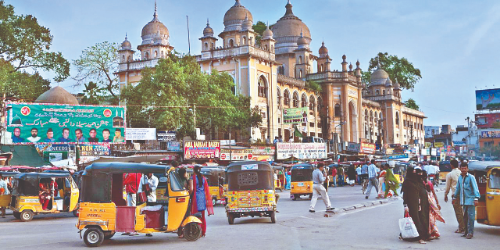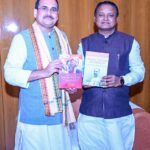For a progressive India
- By : Anirban Ganguly
- Category : Articles

A former Governor of West Bengal, former diplomat and grandson of the Mahatma – Gopal Krishna Gandhi – who has been, throughout his working life, a closet apologist for the Congress dynasty has in a recent political analysis in a national daily called for a “Bhaya Mukt” and “Bhrasht Mukt”
Bharat. Rightly so, no one can have a problem with that call except that the person concerned wants it to be achieved through a collective effort to unseat Narendra Modi. Only if Narendra Modi is unseated and politically exiled will there be, he argues, an India free from fear and corruption. Ironically, it is only after Narendra Modi came to power that a real assault has taken place on corruption and on the atmosphere of fear. Near-monthly terror attacks and blasts across the country have become things of the past. Train bombings, pre-Diwali blasts, a siege of cities and a cowering and clueless central government were spectres that loomed when the dynasty that Mr Gopal Gandhi supported was in power.
The country then was mainly governed by a political syndicate which had reduced the executive head to a mere titular centre while they drove and set the actual agenda. In short, they made a mockery of the political system and allowed a group of unelected and unaccountable advisors and the members of the first dynasty of the Congress to have a field day. Mr. Gopal Gandhi, however, would like us to go back to those days, in which electoral mandates and democratic norms and decorum had no place and in which institutions were demolished and crippled with impunity.
Interestingly, when break-India forces where baying for the dismemberment of India, when factions of these forces were mourning the hanging of a certified terrorist, when these very elements were dancing with glee at every Jawan martyred, Mr Gandhi, who also claims his lineage from the conscience keeper of the Mahatma, C.Rajagopalachari, had kept mum, he had looked the other way and had applauded Rahul Gandhi’s defence of these nefarious forces. He has also been silent on the Urban Naxal agenda of trying to break India from within. It is, therefore, confusing to see Mahatma’s grandson call for the overthrow of Modi, who has done much to reinstate some of the Mahatma’s fundamental ideas and concerns vis-à-vis India’s polity. It has never pricked Mr Gandhi’s conscience, it has never exercised him into trying to find out why the Congress and especially the dynasty had given a quiet burial to the ideals of the Mahatma and had, for that matter, omitted all other stalwarts including C.Rajagopalchari from its ideational and ideological world.
Unfortunately, what Mr Gandhi would like us to forget is that the political masters he has served for so many decades and whose loyal bidding he continues to do were the ones who gave us an India that was driven and burdened with fear and corruption. But before we enter into an analysis of what an anti-Modi front will look like, let us first make it clear that Mr Gopal Gandhi is an intensely political person, with a strong political affiliation and an undying ambition for office.
This overweening ambition of wanting to be in office had led him to plunge into the Vice-Presidential race misadventure. He is someone who is perpetually torn between trying to preserve a veneer of non-interestedness in political and mundane affairs and trying to adorn the moral mantle of the Mahatma, and in between secretly lobbying for political pelf and position. He is someone whose interiors keep gnawing and goad him to find a way out to some high office or other. He wants a ‘reunion of broken parts’ perhaps in such a reunion he sees a chance for himself once again, a possibility to occupy the high domed palace on the Raisina Hill.
But the glue that can reunite the broken parts is missing. Anti-Modism alone does not suffice, abusing Modi ad nauseam cannot garner votes or support in this age and time. People want a programme, a vision for the country, a credible roadmap, all of which Gopal Gandhi’s political idols of the present do not possess. All talks among themselves that some of the leaders of a failed Third Front are now indulging in are a cover to hide their own lack of direction and ambition. The ambition of who will lead the anti-Modi front is an uncontrolled one; it will also be the reason for the dissolution of the attempt.
Gopal Gandhi derides the expression of sentiments on Sabarimala – it shows he is out of tune with the mass mood of this country, he makes fun of the Korean dimension of India’s civilisational outreach and in doing so he indirectly mock the sentiments of millions when it comes to Sri Ram and the aspiration to have a grand temple dedicated to him. It shows his rusty understanding of the concepts of faith, worship, sacredness and paramapara in the Indian context. It also shows how little he has absorbed from his grandfather whose connection with the masses through their tradition was deep and abiding. Gopal Gandhi’s approach to the majority’s attitude towards their issues of faith hints at how his leaders when they reunite and if they ever come to power, will themselves treat or handle those sentiments.
The disdain that Gopal Gandhi showers on Hindu sentiments is an exact reflection of the disdain that Congress and its first family, especially the current crop, have always held towards Hindus and their way of life and of worship. The present circus of offering obeisance at temples indulged in by Rahul Gandhi and his coterie of advisors is certainly a ruse but at a more fundamental level demonstrates that for them matters of majority faith are issues believe in belittling.
So this is the kind of India that Gandhi’s grandson wants us to have, an India in which unbridled ambition among a section of politicians will bring about governance paralysis and instability, an India which will have no direction or agenda to pursue, an India in which the majority faith is looked down upon, is made fun of, is taken recourse to only for electoral gains, an India in which issues of traditions take a back seat, in which Stalinist methods are used to break up faith and faith-related movements, an India in which one single dynasty rules to perpetuate itself and to maintain itself in power, an India in which the Mahatma will continue to adorn posters and banners as a mere slogan, an India in which conflicts of caste and of denominations will once more become the order of the day.
Gopal Gandhi bats for an India which will have regressed, an India in which he shall remain the loyal door-keeper of an exploitative dynasty for whose members, self-aggrandisement is the pre-eminent philosophy of existence and whose rule in the past had institutionalised fear and corruption.
Thus, Gopal Gandhi’s call for a “Bhaya Mukt” and “Bhrasht Mukt” Bharat, is insincere and a pseudo-call, let no one heed it, while he himself is a pseudo-Gandhi, a fake heir of the Mahatma’s great philosophical legacy.

















